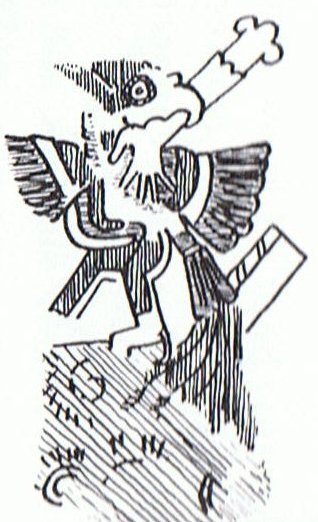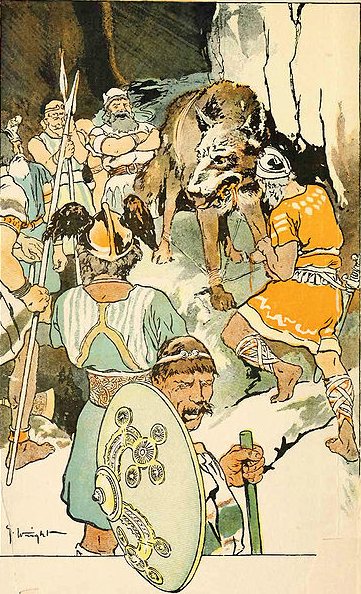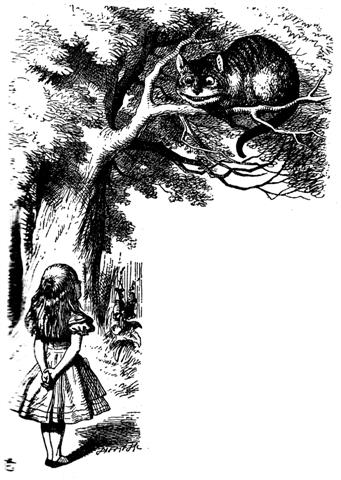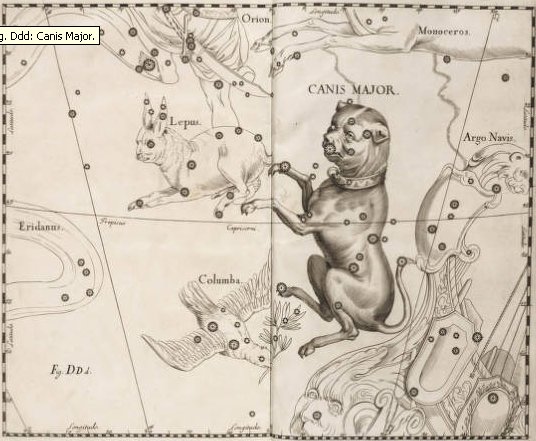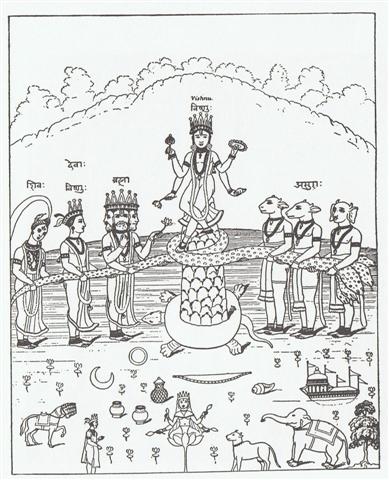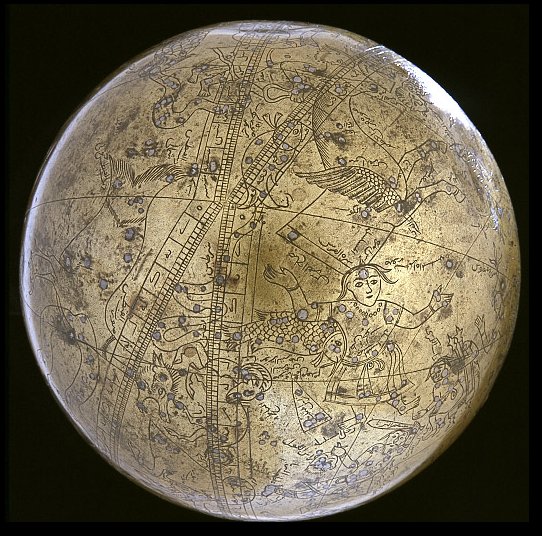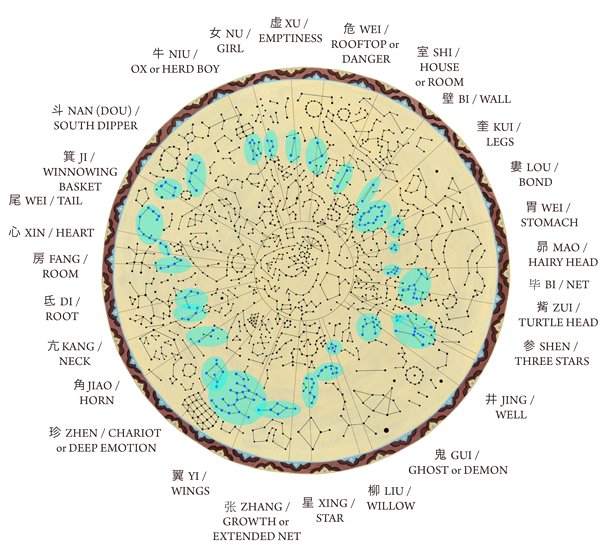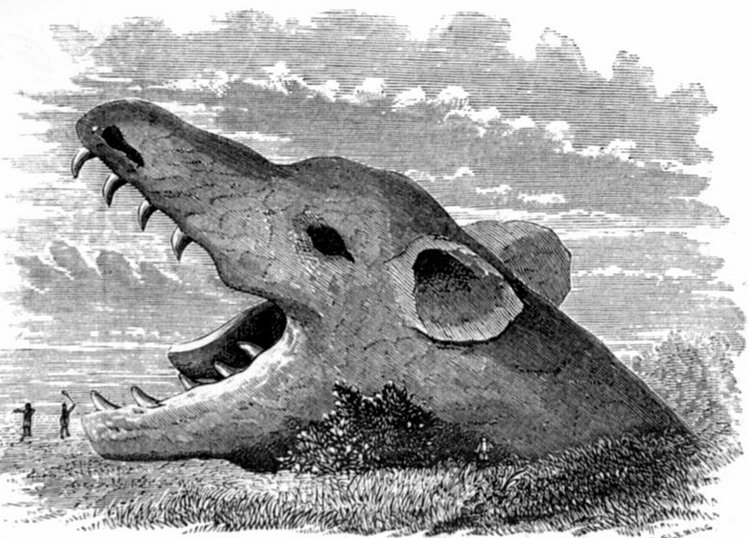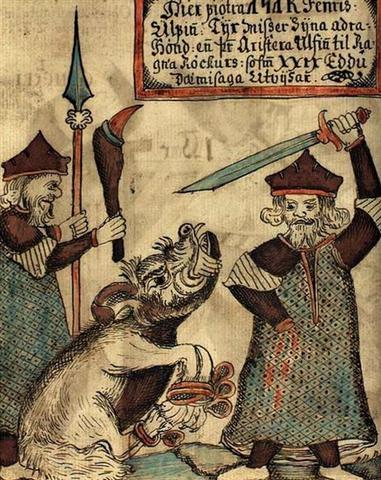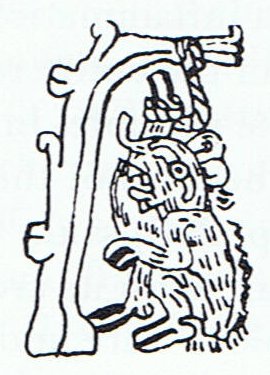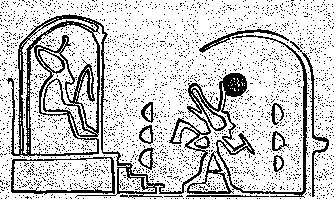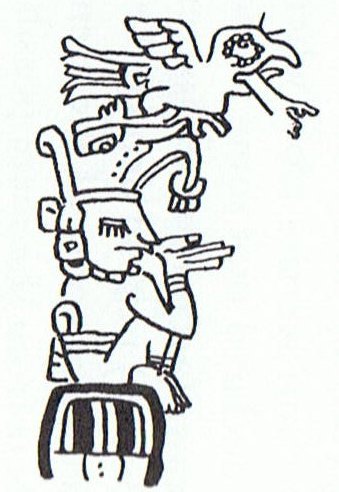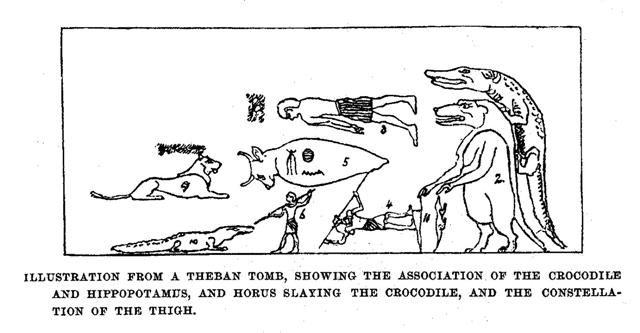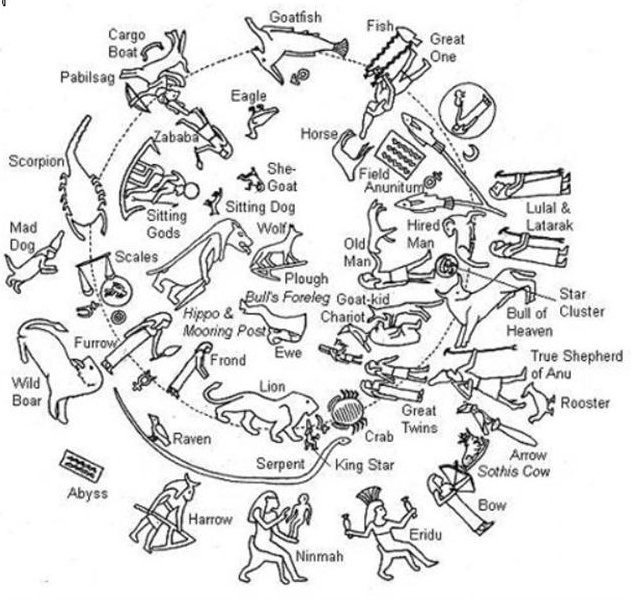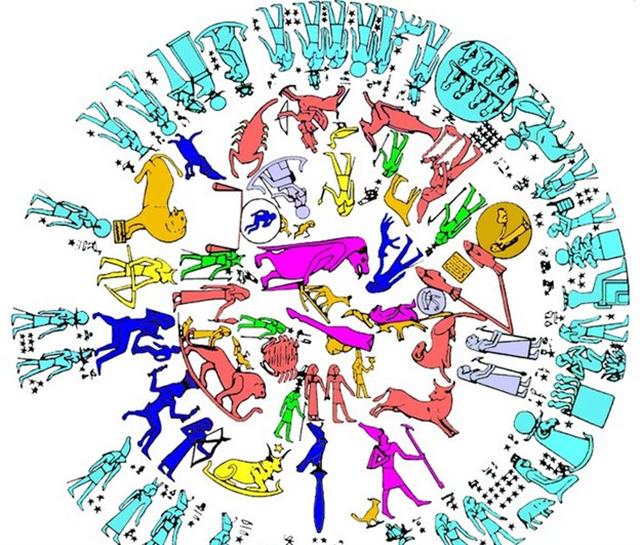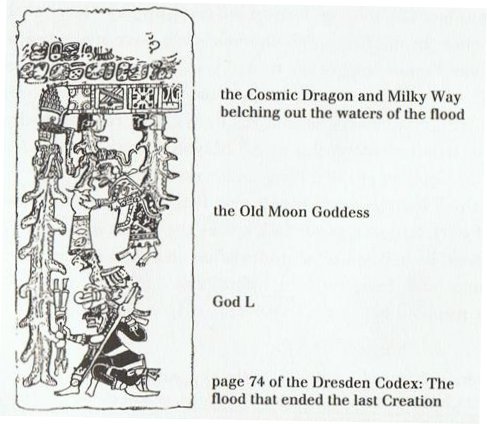The Babylonian 'Mouth' of the Twins (Sha-pu-u-mash-mashu) seems to have had the first part of the Twins down in the Milky Way river:
And the Cat who dared to look the King in the eye had 9 tails (lives).
The 10th time, however, could have necessitated a sacrifice in form of a lost 'head' - or a lost 'right forearm':
... In the Mayan Ball Game Sacrifice the essential rule for the players was to try to get the ball through an opening high up in the wall, which must have been difficult because the ball could only be brought up there by the proper actions of their hips - only these were allowed to touch the ball ...
... The state of the tree loomed large in their thoughts, because it came about at the same time the head of One Hunaphu was put in the fork. The Xibalbans said among themselves: 'No one is to pick the fruit, nor is anyone to go beneath the tree', they said. They restricted themselves, all of Xibalba held back. It isn't clear which is the head of One Hunaphu; now it's exactly the same as the fruit of the tree. Calabash came to be its name, and much was said about it. A maiden heard about it, and here we shall tell of her arrival. And here is the account of a maiden, the daughter of a lord named Blood Gatherer. And this is when a maiden heard of it, the daughter of a lord. Blood Gatherer is the name of her father, and Blood Moon is the name of the maiden. And when he heard the account of the fruit of the tree, her father retold it. And she was amazed at the account: I'm not acquainted with that tree they talk about. It's fruit is truly sweet! they say, I hear, she said. Next, she went all alone and arrived where the tree stood. It stood at the Place of Ball Game Sacrifice. What? Well! What's the fruit of this tree? Shouldn't this tree bear something sweet? They shouldn't die, they shouldn't be wasted. Should I pick one? said the maiden. And then the bone spoke; it was there in the fork of the tree: Why do you want a mere bone, a round thing in the branches of a tree? said the head of One Hunaphu when it spoke to the maiden. You don't want it, she was told. I do want it, said the maiden. Very well. Stretch out your right hand here, so I can see it, said the bone. Yes, said the maiden. She stretched out her right hand, up there in front of the bone. And then the bone spit out its saliva, which landed squarely in the hand of the maiden. And then she looked in her hand, she inspected it right away, but the bone's saliva wasn't in her hand. It is just a sign I have given you, my saliva, my spittle. This, my head, has nothing on it - just bone, nothing of meat. It's just the same with the head of a great lord: it's just the flesh that makes his face look good. And when he dies, people get frightened by his bones. After that, his son is like his saliva, his spittle, in his being, whether it be the son of a lord or the son of a craftsman, an orator. The father does not disappear, but goes on being fulfilled. Neither dimmed nor destroyed is the face of a lord, a warrior, craftsman, an orator. Rather, he will leave his daughters and sons. So it is that I have done likewise through you. Now go up there on the face of the earth; you will not die. Keep the word. So be it, said the head of One and Seven Hunaphu - they were of one mind when they did it ... At Tejat Prior (the front of the left foot of Castor) the creator of the G text placed a man without his head and with his right forearm changed into a rima aueue.
Here, it could be deduced, the time of Aldebaran would have had day 288 (*OCTOBER 15) at the Full Moon.
... Gregory dropped 10 days to bring the calendar back into synchronisation with the seasons. Accordingly, when the new calendar was put in use, the error accumulated in the 13 centuries since the Council of Nicaea was corrected by a deletion of ten days. The Julian calendar day Thursday, 4 October 1582 was followed by the first day of the Gregorian calendar, Friday, 15 October 1582 (the cycle of weekdays was not affected) ... Then came the right back limb of the Great Dog: ... ζ [Canis Majoris] marks the toe of the right hind foot ...
... While Tarquin was thus employed (on certain defensive measures), a dreadful prodigy appeared to him, a snake sliding out of a wooden pillar, terrified the beholders, and made them fly into the palace; and not only struck the king himself with sudden terror, but filled his breast with anxious apprehensions: so that, whereas in the case of public prodigies the Etrurian soothsayers only were applied to, being thoroughly frightened at this domestic apparition, as it were, he resolved to send to Delphi, the most celebrated oracle in the world; and judging it unsafe to entrust the answers of the oracle to any other person, he sent his two sons into Greece, through lands unknown at that time, and seas still more unknown. Titus and Aruns set out, and, as a companion, there was sent with them Junius Brutus, son to Tarquinia, the king's sister, a young man of a capacity widely different from the assumed appearance he had put on. Having heard that the principal men in the state, and among the rest his brother, had been put to death by his uncle, he resolved that the king should find nothing in his capacity which he need dread, nor in his fortune which he need covet; and he determined to find security in contempt since in justice there was no protection. He took care, therefore, to fashion his behaviour to the resemblance of foolishness, and submitted himself and his portion to the king's rapacity. Nor did he show any dislike of the surname Brutus, content that, under the cover of that appellation, the genius which was to be the deliverer of the Roman people should lie concealed, and wait the proper season for exertion ...
He was, at this time, carried to Delphi by the Tarquinii, rather as a subject of sport than as a companion; and is said to have brought, as an offering to Apollo, a golden wand inclosed in a staff of cornel wood, hollowed for the purpose, an emblem figurative of the state of his own capacity. When they were there, and had executed their father's commission, the young men felt a wish to enquire to which of them the kingdom of Rome was to come; and we are told that these words were uttered from the bottom of the cave - 'Young men, whichever of you shall first kiss your mother, he shall possess the sovereign power at Rome' ... Brutus judged that the expression of Apollo had another meaning, and as if he had accidentally stumbled and fallen, he touched the earth with his lips, considering that she was the common mother of all mankind ... Since the very ancient time when the Twins - together with the Outstrected Forearm of the Great White Cat (Tiger) - had been at spring equinox the precession had moved them ahead to the time after summer solstice. And at the time of rongorongo 0h had reached Sirrah (The Navel of the Horse), at the topknot of Andromda:
... 'From the time I was in your womb,' Maui went on, 'I have known the names of these children of yours. Listen,' he said as he pointed to his brothers in turn. 'You are Maui mua, you are Maui roto, you are Maui taha, and you are Maui pae. And as for me, I am Maui potiki, Maui-the-last-born. And here I am.' When he had finished, Taranga had to wipe her eyes because there were tears in them, and she said: 'You are indeed my lastborn son. You are the child of my old age. When I had you, no one knew, and what you have been saying is the truth. Well, as you were formed out of my topknot you can be Maui tikitiki a Taranga.' So that became his name, meaning Maui-formed-in-the-topknot-of-Taranga. And this is very strange, because women in those days did not have topknots. The topknot was the most sacred part of a person, and only men had them ...
The Chinese had a Wolf at their Legs station, at η Andromedae, where the Northern of the pair of fishes had his head, in the right armpit of Andromeda. ... A very detailed myth comes from the island of Nauru. In the beginning there was nothing but the sea, and above soared the Old-Spider. One day the Old-Spider found a giant clam, took it up, and tried to find if this object had any opening, but could find none. She tapped on it, and as it sounded hollow, she decided it was empty. By repeating a charm, she opened the two shells and slipped inside. She could see nothing, because the sun and the moon did not then exist; and then, she could not stand up because there was not enough room in the shellfish. Constantly hunting about she at last found a snail. To endow it with power she placed it under her arm, lay down and slept for three days. Then she let it free, and still hunting about she found another snail bigger than the first one, and treated it in the same way. Then she said to the first snail: 'Can you open this room a little, so that we can sit down?' The snail said it could, and opened the shell a little. Old-Spider then took the snail, placed it in the west of the shell, and made it into the moon. Then there was a little light, which allowed Old-Spider to see a big worm. At her request he opened the shell a little wider, and from the body of the worm flowed a salted sweat which collected in the lower half-shell and became the sea. Then he raised the upper half-shell very high, and it became the sky. Rigi, the worm, exhausted by this great effort, then died. Old-Spider then made the sun from the second snail, and placed it beside the lower half-shell, which became the earth ...
But this wild beast could be overcome by sacrificing the right forearm of Mars (which could explain why Mars was weak in a part of his cycle). The strong Wolf was domesticated and turned into a Dog when he was bound:
... Mars is the red planet and tapa mea means 'the red cloth'. The idea surely is to indicate a contrast to the 'black cloth', by which concept is meant not only 'falling on your face' (dying) but also the 'nightside journey' which follows. Mars seems to be a close relative of Sun, not only by cause of his colour but also because of his lively behaviour ...
Anciently people were fascinated by the periodic backward loops of Mars every two years - he had to be a great navigator. ... When it was evident that the years lay ready to burst into life, everyone took hold of them, so that once more would start forth - once again - another (period of) fifty-two years. Then (the two cycles) might proceed to reach one hundred and four years. It was called 'One Age' when twice they had made the round, when twice the times of binding the years had come together. Behold what was done when the years were bound - when was reached the time when they were to draw the new fire, when now its count was accomplished. First they put out fires everywhere in the country round. And the statues, hewn in either wood or stone, kept in each man's home and regarded as gods, were all cast into the water. Also (were) these (cast away) - the pestles and the (three) hearth stones (upon which the cooking pots rested); and everywhere there was much sweeping - there was sweeping very clear. Rubbish was thrown out; none lay in any of the houses ... In Egypt it was Upwaut the Wolf who Opened up the Way forward:
There was also the constellation at the pole regarded as the 'Thigh' (Foreleg) of a Bull. It was Ursa Major, which corresponded to the Mayan Itzam-Yeh alias Seven-Macaw:
... Now the deluge was caused by the male waters from the sky meeting the female waters which issued forth from the ground. The holes in the sky by which the upper waters escaped were made by God when he removed stars out of the constellation of the Pleiades; and in order to stop this torrent of rain, God had afterwards to bung up the two holes with a couple of stars borrowed from the constellation of the Bear. That is why the Bear runs after the Pleiades to this day; she wants her children back, but she will never get them till after the Last Day ...
|
|||||||||||||||||||||||||||||||||||||||||||||||||||||||||||||||||||||||||||||||||||||||||||||||||||||||||||||||||||||||||||||||||||||||||||||||||||||||||||||||||||||||||||||||||||||||||||||||||||||||||||||||||||||||||||||||||||||||||||||||||||||||||||||||||||||||||||||||||||||||||||||||||||||||||||||||||||||||||||||||








